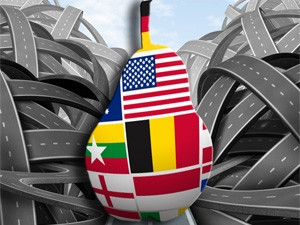
As Gautengers gear up for the onset of open-road tolling and the widespread calamity anticipated by many e-toll sceptics, looking at similar projects that have been implemented or are being planned in other countries could serve as a caveat for SA's authorities.
It is evident e-tolling works in certain cities - like London and Singapore, for example. However, headlines in other countries' publications have revealed some of the things that could go wrong when a system is either begrudged by the country's people or not considered and set up properly.
From exorbitant administration fees for the roads agency in charge, to incompatible systems, high toll fees, lack of buy-in, and tag failure due to faulty installation, global examples could be portentous forewarnings of what could go wrong with SA's e-toll system.
Opposition to Urban Tolling Alliance (Outa) chairman Wayne Duvenage says the problems emerging from e-toll systems gone before SA are "without a doubt" indicative of what could happen in SA - particularly given the poor level of compliance seen locally.
"The culture and attitude of a society to its government makes a big difference. In Europe and Australia, for example, the levels of compliance are much higher. In Johannesburg alone, about 10% of number plates are either false or have been duplicated."
Duvenage says, while he does not condone actions like falsifying number plates, number plate tampering and jamming devices for e-toll evasion, "this is what happens when society feels it is being treated unjustly. People in SA will run roughshod over the system far quicker than those in Europe.
"You have to ask why less than 20% of people pay their traffic fines. Where the admin is weak, society will treat the system with disdain."
E-toll honours
The SA National Roads Agency (Sanral) has consistently upheld government's e-toll system. It has repeatedly outlined the benefits the country will see with its implementation, including the easing of traffic congestion, quicker road improvements, economic growth, tourism, social development and job creation.
In terms of the technical soundness of the system, Sanral spokesperson Vusi Mona says the agency has been running its systems in a live environment for two years already. For this reason, the roads agency argues that when e-tolling officially commences, there will be no major operational differences, though there could be minor hiccups as expected with any new system.
Mona is also of the opinion that South Africans are rational people, once on the brink of pandemonium, but surfacing unscathed. He believes the animosity between society and government will dissipate with time and "[Sanral] and the public will sort this matter out".
In June, the International Bridge, Tunnel and Turnpike Association awarded Sanral the 2013 Toll Excellence Award for Technology for its open road tolling project.
At the time, Sanral CEO Nazir Alli said the award bears testament to what he says is excellence on behalf of the agency, in particular "the inter-operability of the e-toll system on the Gauteng Freeway Improvement Project".
Portugal
In June, ITWeb reported on Portugal's e-toll - or as it is colloquially known, SCUT - woe. At the time, the country's largest circulation English newspaper, The Portugal News, was laden with articles outlining the system's dismal failure less than two years after its launch.

More recently, the Portugal News reported that, while revenue on the less-travelled (but tourist-intensive) Algarve A22 highway had seen a rise of 22%, motorways in the Greater Lisbon Area and in the north saw takings drop by EUR900 000 (about R12 million) during the first six months of the year.
According to the New European Economy, Algarve's population triples during the peak holiday season with an average of seven million foreign tourists annually. The said 22%, says The Portugal News, did not take the peak summer period into account.
Antonio Ramalho, CEO of Portugal's roads agency, Estradas de Portugal, said earlier this year that the e-toll system was unsustainable. If it did not change, he said, the agency would not have enough money to conserve and maintain the road network.
Ramalho pointed out that 29% of toll fees went towards administrative fees, which increased from EUR17 million (about R228 million) in 2011 to EUR42 million (about R562 million) last year. In June, he promised a stringent revision of the system, which The Portugal News says is expected to take effect this month.
Taiwan
In Taiwan - in 2010 - the National Freeway Bureau was set to send a notice to its e-toll operator, Far Eastern Electronic Toll Collection Company, for not meeting the terms of the agreement of its build-operate-transfer contract.
Taipei Times reported at the time that the toll operator was obliged to raise the average rate of those using on-board units to 45%, but Far Eastern only met 38% and said it could not hit the 45% mark. This followed the government's offer of a 20% discount on tolls for those who installed the system.
The government threatened either a fine, or to cancel the contract, the publication reported. Subsequently, in April this year, Far Eastern said collections had hit 75% after it introduced a free-of-charge toll-collecting e-tag to boost use.
India
In March this year, India said e-tolls would be implemented in a year after a successful pilot project, the Times of India reported. An official is quoted as saying it would be implemented on roads covering the Mumbai-Ahmedabad, Chennai-Bangalore and Gurgaon-Jaipur-Beawar stretches.
However, a senior Maharashtra State Road Development Corporation official is quoted as saying the system was launched on an experimental basis in the Mumbai region with a lukewarm response. "We have a dedicated lane, but by and large, the lane is vacant,'" he said.
Times of India quotes him as saying, as people were reluctant to make advance payments, the system failed to take off. "We have a monthly pass system too, but vehicle owners are reluctant to make advance payments."
Hungary, Germany
In Hungary, according to a blog, a system to charge 3.5-ton and up trucks hit a snag after the winning bidder - Getronics, which had no prior experience in the sector - pulled out of the contract because of the late delivery penalties. The system was implemented in the middle of this year.
The same blogger notes that Germany's system, first pondered in 1998, was implemented three years after the mooted 2006 implementation date. Meanwhile, all of the European Union is looking at a satellite system, making the Hungarian system incompatible.
Implementing the system, seen as unfair, has placed a major burden on the private sector, reports Portfolio. In addition, the European Commission has found that Hungary's charges are too high.
Australia
In Australia, a few months ago, toll operator Go Via launched an investigation after a motorist complained an e-tag failed to beep several times while travelling in Brisbane, reports Courier Mail.
A technical team was set to examine e-tags as well as the tolling system that deals with the more than 100 000 vehicles crossing the Gateway Bridge each day using one of six lanes. The complaint was for one area of the bridge.
Other complaints were due to the e-tag not being correctly installed, the paper quoted a spokeswoman as saying.
Share